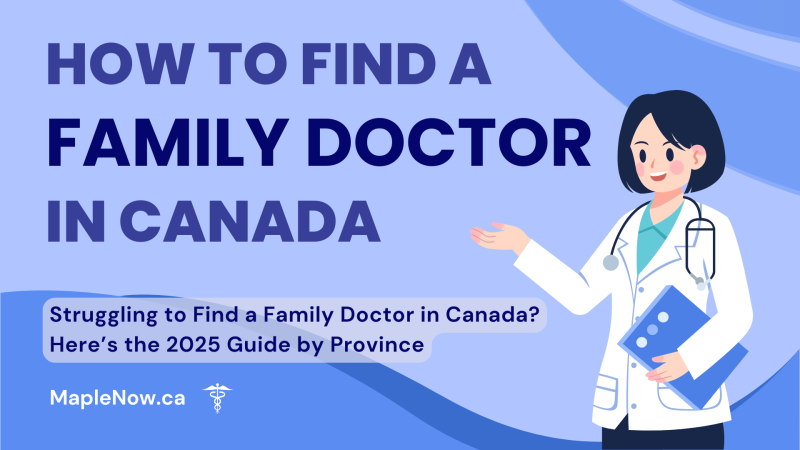
A step-by-step guide for newcomers and residents on navigating waitlists, provincial registries, and insider tips across all provinces and territories.
Finding a family doctor in Canada is a universal challenge, often described as a “hustle.” Waitlists can be long, and the process varies dramatically by province — especially for newcomers navigating a new system.
This practical guide cuts through the confusion. We break down the best strategies across all provinces and territories, with links to official tools and insider tips to speed up your search.
🗺️ Step 1: Register with Your Province’s Official Waitlist
⚠️ Crucial First Step: Before anything else, register with your province’s official waitlist. This is your primary, government-run pathway to getting assigned a doctor. Even if you’re looking elsewhere, stay on this list as a backup.
Each province and territory has an official registry or matching program where you can sign up for a family doctor or nurse practitioner. Once registered, you’ll be added to the queue and contacted when a provider is available.
Where to register by province/territory
| Province/Territory | Registry / Program | How it works |
| BC | Health Connect Registry; Pathways Directory | Join the waitlist; Pathways sometimes shows doctors accepting patients |
| Ontario | Health Care Connect / Health811 | Government “Care Connectors” help you find a doctor |
| Alberta | Alberta Find a Doctor (PCN) | Search by area and filter “Accepting new patients” |
| Quebec | GAMF (Guichet d’accès aux médecins de famille) / GAP | Register online; get assigned when available |
| Manitoba | Family Doctor Finder | Fill out a form and wait for assignment |
| Saskatchewan | Contact local clinics / Saskatchewan Health Authority | No province-wide list — call clinics directly or dial 811 HealthLine for guidance |
| Nova Scotia | Need a Family Practice Registry | Waitlist for family doctors or nurse practitioners |
| New Brunswick | NB Health Link | Offers temporary care and puts you on the list |
| PEI | Patient Registry Program | Register and wait to be matched |
| Newfoundland & Labrador | Patient Connect NL | Online registration and assignment |
| Yukon | Find a Primary Care Provider | Matches you with a doctor or NP |
| Northwest Territories | Local Primary Care Centres | Contact your community health centre directly |
| Nunavut | Community Health Centres | Most care starts at the local health centre |
💡 Tip: Always sign up as soon as you arrive — wait times can be months or even years.
🧑🤝🧑 Step 2: Ask Around in Your Community
Word of mouth is often the fastest way to find a doctor. Try:
- Asking friends, coworkers, neighbors, your local pharmacist, or other parents at your child’s school
- Checking at community centres, libraries, or places of worship
- Posting in local Facebook/Reddit groups (r/CanadaImmigration, r/Ontario, r/Vancouver, etc.)
- Contacting newcomer and settlement agencies (YMCA, MOSAIC, COSTI, ISANS, etc.)
👉 Many people find doctors through community referrals faster than through official registries.
📌 Sample message for local Facebook groups:
Hey neighbours! Just moved to [Neighbourhood/Area] and looking for a family doctor. Does anyone have a recommendation for a great clinic or doctor (GP or NP) who's taking on new patients? Any leads would be awesome. Thanks!
🏥 Step 3: Try Teaching Hospitals & University Clinics
Many provinces have family practice teaching units (linked to universities). They often accept new patients when new resident doctors start training.
✅ Examples:
- Toronto: Women’s College Hospital, Mount Sinai Academic Family Health Team
- Vancouver: UBC Teaching Clinics, St. Paul’s Hospital
- Montreal: McGill University Health Centre clinics
- Halifax: Dalhousie Family Medicine
These clinics are sometimes hidden gems: shorter waits, more thorough follow-up, and access to new resources.
Note: Since care is provided by resident doctors under supervision, your appointments might be longer and you may see different providers over time. However, the quality of care is generally excellent and thoroughly reviewed.
🚶 Step 4: Use Walk-In Clinics as a Bridge
Walk-in clinics aren’t a replacement for long-term care, but they can help while you wait.
Tips:
- Try to see the same doctor each visit.
- After 2–3 visits, politely ask: "Are you accepting new patients for permanent registration?”
Some clinics have an "Attachment Model", where frequent walk-in patients can transition to permanent care.
🔗 Where to find walk-ins:
- Medimap.ca – Check real-time wait times at walk-in clinics
- SkipTheWaitingRoom – Commonly used in Atlantic provinces for booking clinics and labs
- Cortico Health – Online booking platform used by some clinics and community practices
- Google Maps / local clinic websites – Find locations, hours, and patient reviews
- Provincial health websites – Many provinces list local walk-in or virtual clinics
- Pharmacists – Local pharmacists often know which clinics are reliable and accepting patients
Don’t Forget Virtual Walk-In Clinics:
Services like Maple or Telus Health MyCare can handle many common issues remotely, often with shorter waits. Some may be covered by your provincial health plan or employer benefits.
🧠 Final Tips
| ✅ Do This | ❌ Avoid This |
| Register on your provincial waitlist as soon as possible | Don’t wait passively — only checking clinics when desperate |
| Search by postal code (narrower results) | Searching only by city name (too broad) |
| Ask in newcomer, parent, or community groups | Relying only on outdated online lists |
| Follow up every few months | Assuming “no news” means “no hope” |
🏁 Closing Words
No matter where you are in Canada, your health deserves consistent care. Finding a family doctor takes time, but every step — from registering to asking around — brings you closer.
🩵 Stay persistent, be proactive, and know that you’re not alone in this journey.